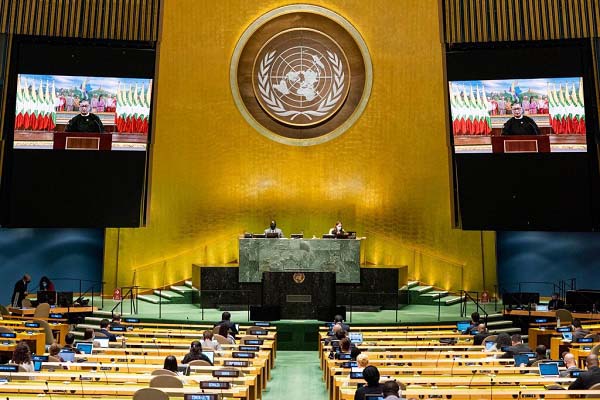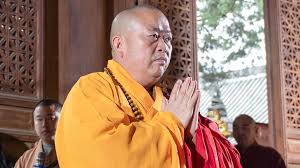UNGA adopts Pak-sponsored resolution calling for respect for sacred religious symbols

United Nations: The UN General Assembly Thursday adopted, by an overwhelming majority, a Pakistan-Philippines sponsored resolution on promoting interreligious and intercultural dialogue that underscored the need for respecting sacred religious symbols.
The resolution is in line with Prime Minister Imran Khan’s vision of interfaith harmony, and combatting Islamophobia as also other forms of intolerance on the basis of religion or belief. Pakistani diplomats have been working hard to advance that vision.
In his address to the 75th Session of General Assembly, the prime minister had highlighted the incidents of Islamophobia and other provocations. He has also called on the United Nations to declare an “International Day to Combat Islamophobia”.
Diplomatic sources said that despite opposition from some western countries during negotiations, the resolution acknowledged the significance and respect accorded to religious symbols in many religions and societies.
The resolution urges States to disseminate values of religious tolerance and interreligious dialogue through educational programmes.
In this regard, it also stresses that the exercise of the right to freedom of expression carries with it special duties and responsibilities and must be subjected to legitimate restrictions such as necessary for respect of the rights or reputations of others, and protection of national security or of public order, or of public health and moral
Speaking in the General Assembly ahead of the vote, Ambassador Mohammad Aamir Khan, Pakistan’s deputy permanent representative to the UN, stressed the need to strengthen mechanisms that promote dialogue and understanding.
Noting the increase in Islamophobia in many parts of the world, he stressed that Islam is a religion of peace and should not be judged by the acts of extremists who exist in all societies. Thus, the international community must effectively address unresolved disputes and conflicts, lack of inclusive socioeconomic development, and anti-migrant rhetoric.
To Pakistan, respecting and promoting freedom of religion and belief is not only a duty to its citizens, but also a way of life.
“Our Founding Fathers declared that the religion, caste or creed of a citizen had nothing to do with the business of the said,” Ambassador Aamir Khan said.
“Today, in Pakistan, we are seeking to build a polity based on the principles of equality, justice, tolerance and solidarity.”
Pakistan also seeks to build relations with its neighbours and others in the international community, he said, pointing out that a prime example of Islamabad’s policy is the initiative taken by the Prime Minister Khan to open the Kartarpur Sahib Corridor between India and Pakistan two years ago.
In the last two years, the Pakistani envoy said the corridor has not only fulfilled the earnest desire of the Sikh community around the world for easy access to the revered site, but is also reflective of the primacy that Pakistan accords to all the religious minorities in the country.
“It was because of these reasons that the Kartarpur Corridor was described by UN Secretary General Antonio Guterres as ‘Corridor of Hope’ during his visit to Kartarpur Sahib in February.”
Thursday’s resolution also takes note of the “Call for Mutual Respect” which was issued by the High Representative of the UN Alliance of Civilization last year in the aftermath of republication of blasphemous cartoons in Franc.
This reference, the sources said, was particularly problematic for western delegations because it underscored that insulting religions and sacred religious symbols provokes hatred leading to polarization and fragmentation of society.
While reaffirming that violence can and should never be justifiable or acceptable response to acts of intolerance, the resolution underscores “that such violence should not be associated with any religion, nationality, civilization or ethnic group”.
A large majority of the member states from the OIC and the developing countries voted for the resolution. The only notable exception from the developing world was India which tried to unsuccessfully mobilize support for deletion of reference to the Kartarpur Corridor.





